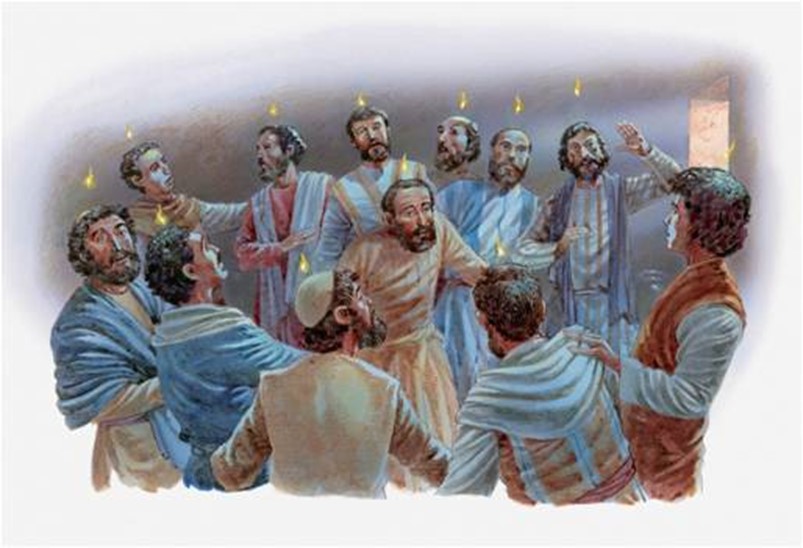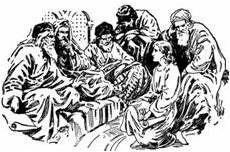
Bible Teaching About Speaking In Tongues
DAY OF PENTECOST
The Day of Pentecost spoken of in Acts 2 has become an inspiration for many. It was a significant event in the formation of the early followers of Christ and was prominent in the spread of the gospel message to other lands.
It was on this occasion that the power of the Holy Spirit was distributed to the disciples so that the gospel message would be given credibility, being supported by miracles.
 Acts 2:1-6
Acts 2:1-6
“1And when the day of Pentecost was fully come, they were all with one accord in one place. 2 And suddenly there came a sound from heaven as of a rushing mighty wind, and it filled all the house where they were sitting. 3 And there appeared unto them cloven tongues like as of fire, and it sat upon each of them. 4 And they were all filled with the Holy Ghost, and began to speak with other tongues, as the Spirit gave them utterance.
5And there were dwelling at Jerusalem Jews, devout men, out of every nation under heaven. 6 Now when this was noised abroad, the multitude came together, and were confounded, because that every man heard them speak in his own language.”
TONGUES (LANGUAGES)
It is important that we make a distinction in the terminology relating to this particular miracle. The authorized version of the Bible uses the word “tongues” (they “began to speak in other tongues”). More recent translations use the word “languages,” which is not only easier for us to understand, but it also helps us to remove some of the confusion in the event.
In a careful reading of the context of Acts 2, we learn that the disciples were given the power to speak in languages that they were not familiar with. These were not unintelligible babblings. Jews who were visiting Jerusalem heard the words of the gospel, spoken by unlearned fishermen, each in the language of their many different homelands. (Read Acts 2: 7-11 to see the many lands that they had come from).
A MIRACLE
This was truly a miracle. Through the power of God, each in their turn, the disciples were able to teach the gospel of salvation in another language. We can assume that all of the visitors knew how to talk the language of the day in Jerusalem, and the gospel could have been taught in that one language to all of the visitors at the same time. Had this been done, the preaching would have been without the dramatic evidence that their words were endorsed by the power of God
The gift of languages added great emphasis to the message. It was like a spectacular visual aid that caused everyone to pay attention to the “wonderful works of God.”
Peter explained the miracle as the fulfilment of an OT prophecy by Joel: “But this is that which was spoken by the prophet Joel: “And it shall come to pass in the last days, saith God, I will pour out of my Spirit upon all flesh: and your sons and your daughters shall prophesy. (Acts 2: 14-21)
“Yet in the church I had rather speak five words with my understanding, that by my voice I might teach others also, than ten thousand words in an unknown tongue.” (1 Corinthians 14:19)
Paul’s Teaching on Tongues
 The Apostle Paul writing to the Corinthians devoted an entire chapter (1 Corinthians 14) to the subject of speaking in tongues. His emphasis was on how important it is to speak with understanding, when in a group, so that all may be edified and uplifted.
The Apostle Paul writing to the Corinthians devoted an entire chapter (1 Corinthians 14) to the subject of speaking in tongues. His emphasis was on how important it is to speak with understanding, when in a group, so that all may be edified and uplifted.
It is difficult to understand how anyone could read and understand Paul’s teachings on this subject and still justify speaking with strange tongues in the church.
Unknown Tongues
The problem is not in the use of other languages, such as were spoken at Pentecost. These were languages that were understood by the hearer. Today, some who “speak in tongues” are speaking unintelligible words. There is no language. They do not even understand what they are saying themselves.
Contrary to Paul’s instruction, there is often no interpreter, and even when there is one, the process is still very confusing and appears to have no purpose in promoting an understanding of the gospel.
There are some religions that insist on an experience in speaking with tongues as a rite of passage. You are not considered to be a member of the church unless you have manifested this gift. The pressure is so intense that compliance to the requirement is often fabricated. (After all, who would really know if you were influenced by the Spirit, or just making babbling sounds?)
“And even things without life giving sound, whether pipe or harp, except they give a distinction in the sounds, how shall it be known what is piped or harped? For if the trumpet gives an uncertain sound, who shall prepare himself to the battle? So likewise ye, except ye utter by the tongue words easy to be understood, how shall it be known what is spoken? for ye shall speak into the air.” (1 Corinthians 14:7-9)
Paul asked the Corinthians to use sound reasoning concerning this subject. He appeals to them in these words: “Brethren, be not children in understanding: howbeit in malice be ye children, but in understanding be men.” (Verse 20)
His desire was that all things be done “decently and in order” That they would speak words that could be easily understood so that the listeners would be edified. “For God is not the author of confusion, but of peace, as in all churches of the saints.” (Verse 33)
” Even so ye, forasmuch as ye are zealous of spiritual gifts, seek that ye may excel to the edifying of the church.” (1 Corinthians 14:12)
Desire Better Gifts
Paul made one thing very clear; that speaking in tongues was a gift that had very little practical value. Especially as they understood and applied it. They should have realized that this gift of languages (as introduced at Pentecost) was for a sign to impress unbelievers with the truth of the gospel message.
Once the unbelievers were baptized and became members of an Ecclesia, there was another need. When they came together for worship, they needed to be edified, comforted and exhorted. (1 Corinthians 14:3)
He encouraged men to seek after the talent to build up the church, the “body of Christ.” Speaking in another language had its purpose on certain occasions, such as preaching in a strange land, but while they were at home in their own assembly, this ability was neither necessary nor useful.
One Body, many Members
The household of believers (the one body) is made up of many members. There are always the few who are the apostles. They travel forth and teach unbelievers about the gospel of salvation. In that work, as we consider our world today, it may be useful to learn another language. We no longer have the first century gifts of the Holy Spirit at our disposal, and such talents today are subject to God’s blessing on our own effort.
Most of the membersof the body are not preachers; nor do they need to speak Spanish or French. They need to develop their talents, with God’s blessing, in other skills. Skills that will be useful to their brothers and sisters in the faith.
Paul talks about the body of Christ and the role of each and every member in 1 Corinthians 12. All of the members are different. Each with their own talent, but all serving to compliment the whole body.
Edifying the Body
Paul encourages all members to follow after love, which is the one gift that is a necessary part of any talent that will edify the body of Christ. Natural men are inclined to seek after talents that are of great show with the potential for personal glory. Was this the reason the gift of tongues was sought after by the Corinthians?
Love, is a gift that is not self-seeking, it seeks not its own. It is interesting that Paul presented his thoughts on love in the chapter in between his writing on the body, and the chapter on tongues. 1 Corinthians 13 provides us with an excellent description of the value of love, for both the individual and for our relationships between one another.
“Love is patient, love is kind. It does not envy, it does not boast, it is not proud. It is not rude, it is not self-seeking, it is not easily angered, it keeps no record of wrongs. Love does not delight in evil but rejoices with the truth. It always protects, always trusts, always hopes, always perseveres. Love never fails. But where there are prophecies, they will cease; where there are tongues, they will be stilled..” (1 Corinthians 13: 4-8 NIV)
“Likewise the Spirit also helpeth our infirmities: for we know not what we should pray for as we ought: but the Spirit itself maketh intercession for us with groanings which cannot be uttered.” (Romans 8:26)
TONGUES AND PRAYER
When we speak or pray in the assembly of the brethren, we must always use words that are easy to be understood. If there is another language involved, there must be an interpreter or someone who understands the language so that all may be edified.
There is only one time when it is considered reasonable to be at a loss for intelligible words in our worship to God, and that is in private prayer. Paul in 1 Corinthians 14 writes many words on this subject. One of his conclusions is: “But if there be no interpreter, let him keep silence in the church; and let him speak to himself, and to God.” (1 Corinthians 14:28)
SILENT INDIVIDUAL PRAYER
 This speaking “to himself, and to God” may be what Paul had reference to in the quotation from Romans 8.
This speaking “to himself, and to God” may be what Paul had reference to in the quotation from Romans 8.
Jesus spoke about both public and silent prayer. He encouraged us: “When thou prayest, enter into thy closet, and when thou hast shut thy door, pray to thy Father which is in secret; and thy Father which seeth in secret shall reward thee openly” – – “Be not ye therefore like unto them: for your Father knoweth what things ye have need of, before ye ask him.” (Matthew 6:5-8)
Normally, we are encouraged even in our own closet, to pray with understanding using words that can be understood. But there may be times, when in despair, we are at a loss for words and we have needs that we are not able to express.
We are fortunate to have Jesus as our mediator. He understands the feelings of our infirmities, and even when our groanings are barely uttered, Jesus will make intercession for us, to a loving father who knows our needs before we ask. (See Hebrews 4:15)
Starting right – A Religion that Makes Sense
![]()
